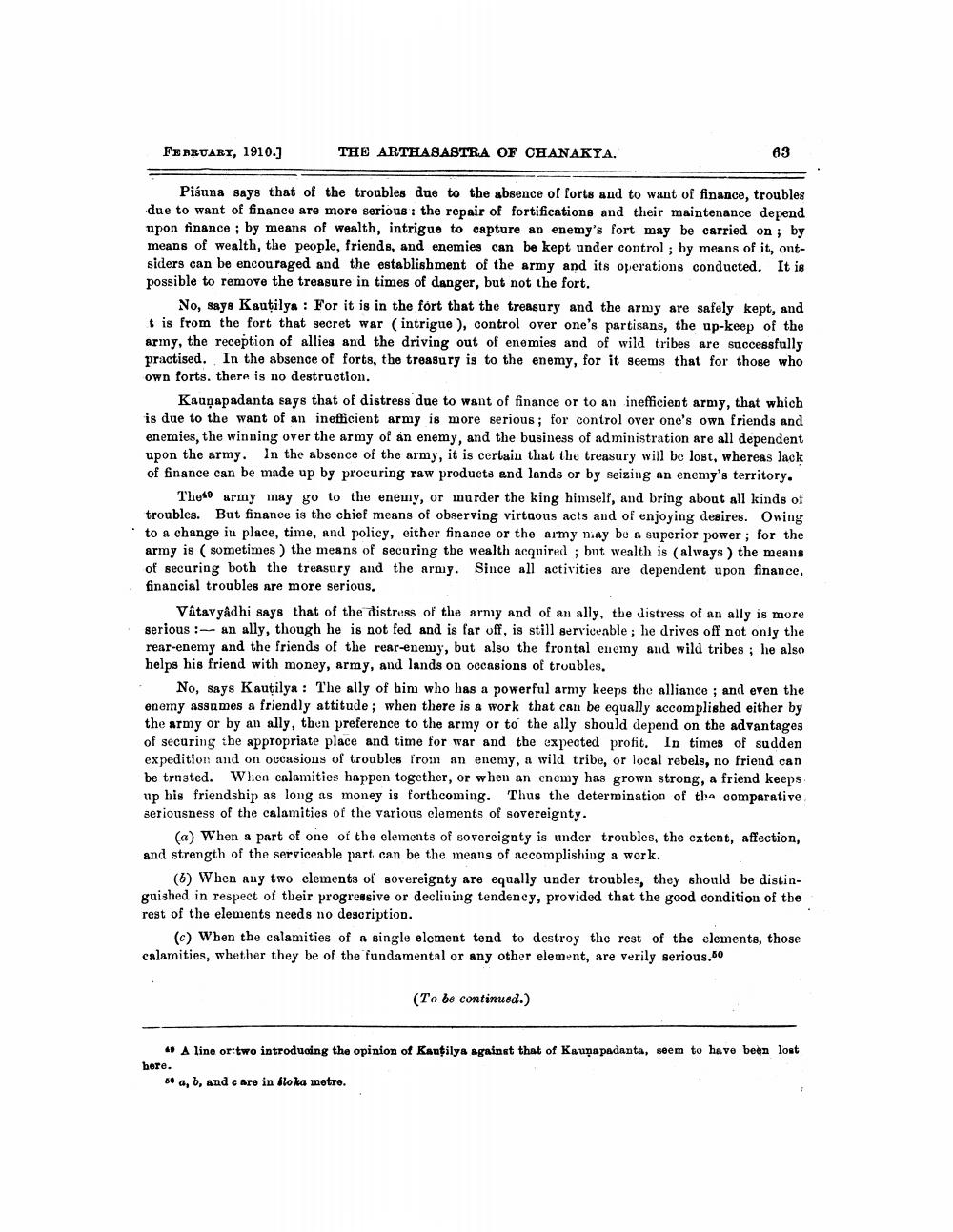________________
FE RRUARY, 1910.)
THE ARTHASASTRA OF CHANAKYA.
63
Pisuna says that of the troubles due to the absence of forts and to want of finance, troubles due to want of finance are more serious: the repair of fortifications and their maintenance depend upon finance ; by means of wealth, intrigue to capture an enemy's fort may be carried on; by means of wealth, the people, friends, and enemies can be kept under control; by means of it, outsiders can be encouraged and the establishment of the army and its operations conducted. It is possible to remove the treasure in times of danger, but not the fort.
No, says Kautilya : For it is in the fort that the treasury and the army are safely kept, and t is from the fort that secret war (intrigue ), control over one's partisans, the up-keep of the army, the reception of allies and the driving out of enemies and of wild tribes are successfully practised. In the absence of forts, the treasury is to the enemy, for it seems that for those who own forts. there is no destruction.
Kauņapadanta says that of distress due to want of finance or to an inefficient army, that which is due to the want of an inefficient army is more serious; for control over one's own friends and enemies, the winning over the army of an enemy, and the business of administration are all dependent upon the army. In the absence of the army, it is certain that the treasury will be lost, whereas lack of finance can be made up by procuring raw products and lands or by seizing an enemy's territory.
The army may go to the enemy, or murder the king himself, and bring about all kinds of troubles. But finance is the chief means of observing virtaous acts and of enjoying desires. Owing • to a change in place, time, and policy, either finance or the army may be a superior power; for the
army is sometimes the means of securing the wealth acquired ; but wealth is (always ) the means of securing both the treasury and the army. Since all activities are dependent upon finance, financial troubles are more serious.
Vatavyâdhi says that of the distress of the army and of an ally, the distress of an ally is more serious : an ally, though he is not fed and is far off, is still servicenble; he drives off not only the rear-enemy and the friends of the rear-enemy, but also the frontal enemy and wild tribes; he also helps his friend with money, army, and lands on occasions of troubles. . No, says Kautilya: The ally of him who has a powerful army keeps the alliance; and even the enemy assumes a friendly attitude ; when there is a work that can be equally accomplished either by the army or by an ally, then preference to the army or to the ally should depend on the advantages of securing the appropriate place and time for war and the expected profit. In times of sudden expedition and on occasions of troubles from an enemy, a wild tribe, or local rebels, no friend can be trusted. When calamities happen together, or when an enemy has grown strong, a friend keeps up his friendship as long as money is forthcoming. Thus the determination of the comparative seriousness of the calamities of the various elements of sovereignty.
(a) When a part of one of the elements of sovereignty is under troubles, the extent, affection, and strength of the serviceable part can be the means of accomplishing a work.
(6) When any two elements of sovereignty are equally under troubles, they should be distinguished in respect of their progressive or declining tendency, provided that the good condition of the rest of the elements needs no description,
(c) When the calamities of a single element tend to destroy the rest of the elements, those calamities, whether they be of the fundamental or any other element, are verily serious.50
(To be continued.)
4 A line or two introducing the opinion of Kanţilya against that of Kaunapadanta, seem to have been lost bere.
06 a, b, and care in floka metre.




